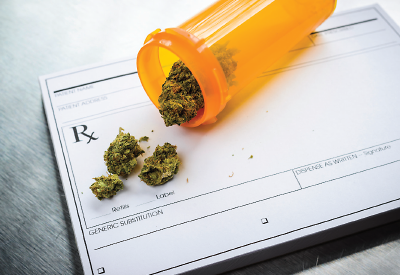The times they are a-changing when it comes to marijuana use, and psychiatrists must update their knowledge to keep pace with the law and the science, say organizers of a symposium on cannabis use disorders at APA’s Annual Meeting in San Diego.
“We expect clinicians who are interested in practical knowledge they can integrate into their practices will join us,” said Kevin Gray, M.D., a professor and director of child and adolescent psychiatry at the Medical University of South Carolina in Charleston.
The world of cannabis is changing rapidly, partly because of the advance of legalization and partly because of advances in research in the science.
Legalization reflects an increased acceptance of cannabis for medicinal or recreational use, coupled with a decreasing perception of harm among the public.
Legalization also is upsetting the hodge-podge of state and federal laws on possession and use of marijuana and workplace requirements for drug testing, all policies that demand a new look now. For instance, what happens when an employee “fails” a drug test in a state that has made medical marijuana legal?
As for research, an older body of literature tended to DRAW ON retrospective studies while more recent work is prospective and includes more on the interaction between cannabis use and co-occurring psychiatric disorders, especially ADHD and psychoses, said Gray.
One segment of the session will focus on the potential for mobile technology in research and treatment. Smartphones could record patients’ usage patterns and timing. Learning whether triggers arise in moments of stress or during socially pleasant times could help target prevention and therapy, said Gray.
As someone who treats young people, Gray also wants to take a close look at effects of cannabis on adolescents.
“We’ve learned a lot in recent decades about how the brain develops, and we need to link that knowledge to normal psychosocial risk-taking of youth,” said Gray. “That combination leads to a 1:6 likelihood of dependence after initiation, almost twice the 1:11 rate for adults.”
Other presenters include Anne Eden Evins, M.D., M.P.H., and Laurence Westreich, M.D. The chair of APA’s Council on Addiction Psychiatry, Frances Levin, M.D., will serve as the discussant.
“Cannabis is now a lightning-rod issue in this country,” said Gray. “We need to understand, assess, and manage its use in our patients, especially if they have co-occurring psychiatric disorders.” ■
“Cannabis Use Disorder: Management, Emerging Issues, and Best Practices for the General Psychiatrist” will be held Wednesday, May 24, 2 p.m. to 5 p.m. in Room 24A in the San Diego Convention Center.

